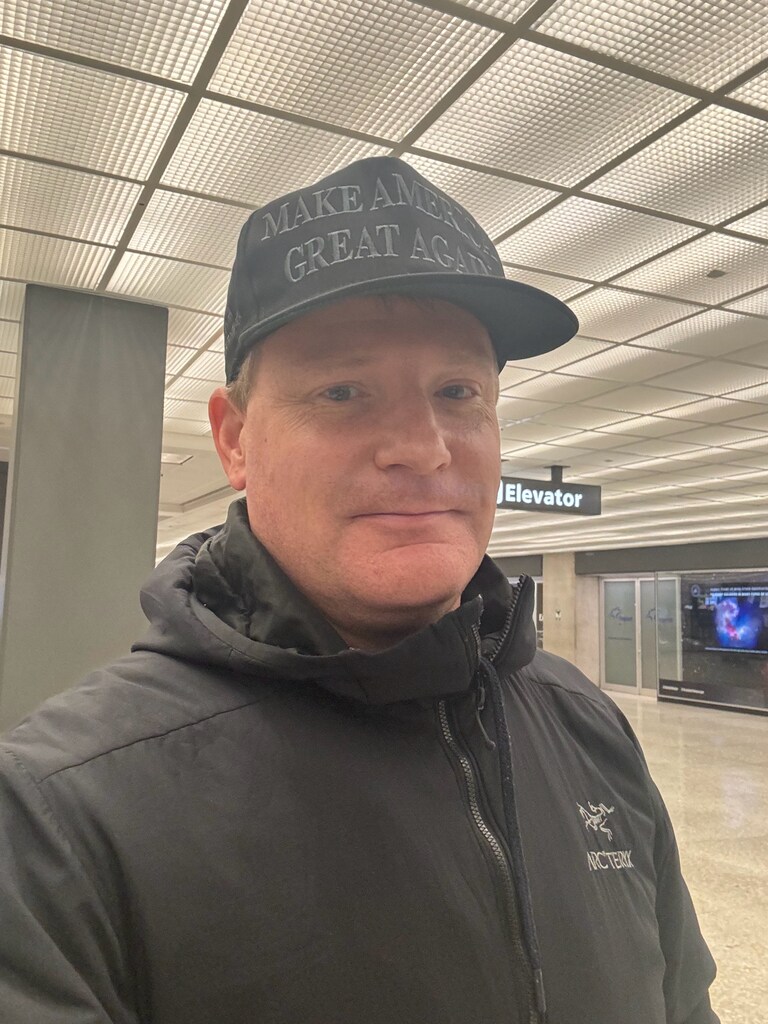You look like Mike Davis. Are you Mike Davis? LolFor the first time in 4 years, I am excited to land in Washington, DC.I bet my Dark MAGA hat will be a yuuuge hit.


Jack Poso 🇺🇸 on GETTR: NEW: The real reason Marsha Blackburn is supportin...
NEW: The real reason Marsha Blackburn is supporting John Thune for leader is because her campaign st...gettr.com
View attachment 225555
Install the app
How to install the app on iOS
Follow along with the video below to see how to install our site as a web app on your home screen.
Note: This feature may not be available in some browsers.
You are using an out of date browser. It may not display this or other websites correctly.
You should upgrade or use an alternative browser.
You should upgrade or use an alternative browser.
Social Dance Your Cares Away/Fraggle/Law Abiding Citizens
- Thread starter Bryan74b
- Start date
Casual chat, hobbies, interests, and community
And I guarantee they are all THRILLED that your stupid ass won't be participating. Now they don't have to listen to your annoying shrill voice and look at your whore daughter n twink son.
Holy shit…that’s what I said
Nope, ain't me. Won't catch me in DC unless at an airportYou look like Mike Davis. Are you Mike Davis? Lol
"sources" to CNN are fucking fabricated.
So, it’s just a reciprocal relationship where they obtain gratification by farting at one another
View attachment 225538

That's awesome. Glad you had a good time. Did you get a chance to go inside the Dome or Basilica?Well, the football was.. subpar, at least by Florida State. However, the weekend was amazing. Got to hit up the Linebacker Lounge, a place I’ve wanted to drink a few beers for about 35 years. Saw family that I had not seen in almost 30 years. Got an awesome stadium/campus tour courtesy of my brother, the younger and not so good looking of the two of us in the pics. For the most part, the Notre Dame fans were great, I almost had to drop the people’s elbow on a rambunctious 18 year old wh wanted to run his mouth unsolicited- I don’t know if that says more about me or him but I am an equal opportunity shit talker, even at 1-9. Weather was great. Temps in the low 60s to high 40s, which was an great break from the central FL heat and humidity.
Yeah, not buying this nonsense. I think this is more about you.Good access! Did you hit up the Windy City Noles crew? Whenever those ND assholes come to Doak they are the worst fanbase ever. Worse than NC state fans. Glad to hear they are different up there.
No she won'tI sent her a nice email about it and this was the response.
I appreciate you reaching out to me on this issue. I will keep your views in mind as discussions about leadership roles take place in the Senate Republican Conference, and you may be assured I will continue to work with members of leadership and my colleagues to advance policies that benefit all Tennesseans.
Submarines.
What about the good folks who told her to do it?
I want to hear from Trump who he supports. One or more people. Then they need to select that person or somebody from that list.
This feels like a huge test of how trump’s administration is going to go - can he get passed the uniparty/deep state blockade to get things done this time?
Dat jussa baby cowboya hata.
Pennsylvania and Nevada don't require voter ID.
I'll wait until tomorrow or Tuesday to call Capito and Justice. Tomorrow is veterans day so they'll probably be out. I'll leave a voice-mail but like to speak with a rep from their team to see if there's been a high call volume.
Left a voice-mail for Capito. Jim justice doesn't have a senate so I called his governor number, no voice-mail option, not surprised.
You can call your senator at 202-224-3121.
Ask for a public vote. No on Thune and Cornyn.
I added that choice is Vance or Rick Scott.
If you need direct numbers let me know. There's an app called Bill Blaster promoted by Steve Bannon's War room.
CNN Correspondent René Marsh:
“We are in a new dystopian hellscape — that is from a federal employee via text message last night, and that is the mindset of many of the 2 million federal workers anticipating Donald Trump’s return to office.
Some employees who lived through the first Trump administration say they are experiencing PTSD.
One saying, quote, ‘We are absolutely having conversations amongst ourselves about whether we can stomach a round two.’”
Source: Real America’s Voice, CNN
A big Whaaaaaah!
You may be an asset... but nobody'd ass is that set!
CNN CORRESPONDENT: FEDERAL WORKERS REPORT PTSD OVER TRUMP’S RETURN
CNN Correspondent René Marsh:
“We are in a new dystopian hellscape — that is from a federal employee via text message last night, and that is the mindset of many of the 2 million federal workers anticipating Donald Trump’s return to office.
Some employees who lived through the first Trump administration say they are experiencing PTSD.
One saying, quote, ‘We are absolutely having conversations amongst ourselves about whether we can stomach a round two.’”
Source: Real America’s Voice, CNN
View attachment 225564
You may be an asset... but nobody'd ass is that set!
Trump Issues Demands in Senate Leadership Race: Next Senate Leader Must Commit to 'Recess Appointments' and Block Last-Minute Democrat Judges Before Inauguration Day | The Gateway Pundit | by Jim Hᴏft

 www.thegatewaypundit.com
www.thegatewaypundit.com

Trump Issues Demands in Senate Leadership Race: Next Senate Leader Must Commit to 'Recess Appointments' and Block Last-Minute Democrat Judges Before Inauguration Day | The Gateway Pundit | by Jim Hᴏft
In the wake of a decisive Republican victory, President-elect Donald Trump has reshaped the stakes in next week’s contest to replace outgoing Senate Republican Leader Mitch McConnell.
For the gamblers.
Big movement for Rick Scott since yesterday.

 polymarket.com
polymarket.com
Big movement for Rick Scott since yesterday.
Next Senate Majority Leader?
Polymarket | This market will resolve to "Yes" if John Thune is announced as the next Senate Majority Leader after the 2024 U.S. General Election. Otherwise,...
If you want to know what our Constitutional republic is supposed to look like, the federal government has these enumerated powers.
The enumerated powers of the federal government, as outlined in Article I, Section 8 of the United States Constitution, are:
*Enumerated Powers*
1. Coin money and regulate currency
2. Regulate commerce among states and with foreign nations
3. Establish uniform laws on bankruptcy
4. Issue patents and copyrights
5. Establish post offices and postal roads
6. Create federal courts inferior to the Supreme Court
7. Punish counterfeiting
8. Declare war
9. Raise and support armies
10. Provide for a navy
11. Make rules for the military
12. Call forth the militia to enforce laws, suppress insurrections, and repel invasions
13. Provide for organizing, arming, and disciplining the militia
14. Exercise exclusive legislation over the District of Columbia
15. Make laws necessary for executing these powers (Necessary and Proper Clause)
Additionally, the Constitution grants other powers through:
*Other Powers*
1. The Supremacy Clause (Article VI, Clause 2): Federal law supersedes state law.
2. The Treaty Clause (Article II, Section 2): The President negotiates treaties.
3. The Appointments Clause (Article II, Section 2): The President appoints federal officials.
These powers establish the federal government's authority and limitations.
Everything outside of these powers was meant to be acceded to the states, which then accede local powers.
The framers recognized that the closer citizens were to the decision makers, the more easily they could be held accountable. Citizens who oppose state policy can relocate to a state where governance is more to their liking.
Decentralization under Trump will put us back on a Constitutional footing, increase voter oversight and massively reduce the cost of the federal government.
The enumerated powers of the federal government, as outlined in Article I, Section 8 of the United States Constitution, are:
*Enumerated Powers*
1. Coin money and regulate currency
2. Regulate commerce among states and with foreign nations
3. Establish uniform laws on bankruptcy
4. Issue patents and copyrights
5. Establish post offices and postal roads
6. Create federal courts inferior to the Supreme Court
7. Punish counterfeiting
8. Declare war
9. Raise and support armies
10. Provide for a navy
11. Make rules for the military
12. Call forth the militia to enforce laws, suppress insurrections, and repel invasions
13. Provide for organizing, arming, and disciplining the militia
14. Exercise exclusive legislation over the District of Columbia
15. Make laws necessary for executing these powers (Necessary and Proper Clause)
Additionally, the Constitution grants other powers through:
*Other Powers*
1. The Supremacy Clause (Article VI, Clause 2): Federal law supersedes state law.
2. The Treaty Clause (Article II, Section 2): The President negotiates treaties.
3. The Appointments Clause (Article II, Section 2): The President appoints federal officials.
These powers establish the federal government's authority and limitations.
Everything outside of these powers was meant to be acceded to the states, which then accede local powers.
The framers recognized that the closer citizens were to the decision makers, the more easily they could be held accountable. Citizens who oppose state policy can relocate to a state where governance is more to their liking.
Decentralization under Trump will put us back on a Constitutional footing, increase voter oversight and massively reduce the cost of the federal government.
Similar threads
- Replies
- 10
- Views
- 376
- Replies
- 13
- Views
- 651
- Replies
- 6
- Views
- 403
Support Free Speech
- Current cycle
- $118.17
- Total amount
- $740.17
